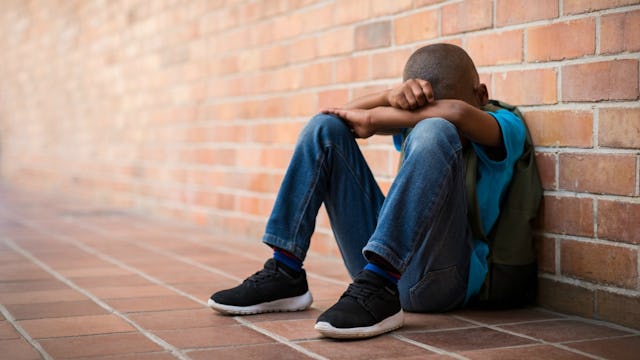Why It Was Different When My Brown Child Took A Pack Of Candy

I never would have known, or I would have found out much later, if they hadn’t fallen out of his pocket, clattering onto the blacktop, as we ran across the parking lot.
It was a pack of Mentos.
I hadn’t bought anyone Mentos. What I had bought were some Batman shirts for a child whose birthday party we were going to be late to.
“Did you take those!?” I jerked my boy’s arm and steered us right back toward Old Navy. Omigod. Omigod. Omigod. “You did! What made you think you could take them? You asked me if you could have them, and I said no! So you took them!? Omigod. Omigod. Omigod. That’s it. No Chuck E. Cheese’s party for you! We are going home!”
“I saw them on the floor, so I thought I could take them.”
“That is bul…baloney, and you know it. You don’t take things from a store if you haven’t paid for them, and you know it!” I shouted. “You do this when you’re older, and Mama can’t help you. I cannot help you. Do you understand?”
Of course he didn’t. How could he?
I burst into Old Navy, dragging my son and his poor little sister behind me. Wearing a mask of fury and shame, I presented myself in front of a cashier. “We took these by mistake,” I confessed, placing the swiped confection on the counter.
Looking confused, she nodded and we left. We went to Chuck E. Cheese’s anyway. I intended to give the birthday boy his present and explain what happened, but we wound up staying. Why should Lady A suffer for her brother’s actions? And besides, we were already there. I made him sit alone in a time-out for the first hour, before he could play a single game. And because it takes a village of nosy people who love to give advice, I decided that after the party, he would take his little behind back to Old Navy to fess up to the security guard and the store manager.
He could barely look at them for the tears in his eyes. And both men—young white men no more than 30—felt such pity for my son, they almost wanted to apologize to him, this cute little black boy who committed an innocent mistake—a normal, childlike lack of judgment and test of boundaries. He didn’t mean any harm.
I talked it over with mom friends of mine, both black and white, who regaled me with tales about how they or their siblings had stolen things as children. Everyone thought I did the right thing by giving him a time-out at the party, making him return the goods, and not allowing him to play outside after school for several days. But beyond that, I was digging too deep into my Catastrophe Playbook in thinking this predicted bad things to come.
In a different world, I could say that I completely overreacted in my rage, desperation and, most of all, fear. But I knew I wasn’t overreacting. The consequences are greater for people of color. Just the other day a good friend told me about her “chubby white teenage nephew” who was caught stealing from a convenience store. Not a thing happened to him. For a kid with more melanin, would events have unfolded the same way?
All I could see was my son doing something so stupid at 15, when he is tall and chiseled, no longer the sweet little boy burying his teary face in Mommy’s leg. I got sick to my stomach imagining him facing a store owner or manager insistent upon on pressing charges, a petty offense spiraling into disaster.
But instead of becoming enraged at a barely 6-year-old boy who had committed a normal childhood infraction—something which merited parental consequences before being tucked into the vault of family lore—I should have been furious at our current state of affairs. How is it that 50 years after the death of Rev. Martin Luther King Jr., black parents lose sleep knowing that their children are still judged by the color of their skin and not by the content of their character?
How is it that black parents still have to give their sons “the talk” because one wrong move could ruin, if not end, their life?
And how is it that most white mothers have to worry about almost none of the above?
As a parent, I‘ve had many moments of exhaustion, stress and madness. But parenting within a vicious double standard took me somewhere else altogether.
I felt insane—especially knowing that this was only the beginning.
This article was originally published on